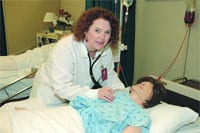Preparing the ‘Nurse of the Future’ STCC, UMass, Baystate Receive Grant for Program Focusing on Core Competencies
Mary Tarbell calls it “a framework for the future of nursing education and practice in Massachu-setts.”
That’s how she described a set of 11 nursing competencies defined by a planning committee of nurse educators and nurse leaders convened by the Mass. Department of Higher Education (DHE) and the Mass. Organization of Nurse Executives two years ago. Those competencies are at the heart of a $60,000 in grants from the DHE and the Mass. Hospital Assoc. for something called the “Nurse of the Future” initiative.
The Springfield Technical Community College (STCC) School of Nursing, which Tarbell directs as the college’s dean of Nursing; the UMass School of Nursing; and Baystate Medical Center (BMC) are the recipients of the grants. STCC’s associate’s degree Nursing program, the UMass bachelor’s degree program, and BMC’s new-nurse orientation program will be analyzed in light of those core competencies.
“This framework was established with the goal that every RN graduating from any level or any nursing program in the Commonwealth should be competent in these 11 areas,” said Tarbell, adding that the competencies encompass knowledge, attitude, and skills.
The identified Nurse of the Future competencies, she continued, are: patient-centered care, professionalism, leadership, systems-based practice, informatics, communication, teamwork and collaboration, safety, quality improvement, evidence-based practice, and nursing knowledge.
The DHE grant will enable the three institutions to conduct a gap analysis, studying their own curriculum to identify any possible gaps between the current learning opportunities for student nurses and the competency goals. The analysis will be completed by June 30 of this year. A proposed further phase of the initiative is intensive faculty summer workshops to design implementation of the competencies.
Additional goals of the Nurse of the Future initiative are to establish a seamless pathway between STCC’s associate’s degree RN program and the UMass RN-to-BSN program, said Tarbell, and to increase the number of potential nurses entering these programs.
Ann H. Cary, associate dean for academic affairs at the School of Nursing and principal investigator for the UMass Amherst component of the grant, said, “it is our privilege to be on the cutting edge of educational and professional experimentation and reform in Massachusetts and to take a leadership role in the nation. We value our partnerships with our state institutions as together we aim to improve the education of nurses and the delivery of health care to the citizens of Massachusetts and the country.”
Preparing the ‘nurse of the future’ is the goal of a regional partnership among education and service providers. According to the project abstract, “STCC, UMass, and BMC are founding and principal members of Collaborating for the Advancement of Nursing Developing Opportunities (CAN DO).
“CAN DO,” it continues, “is the Western Mass. alliance of 16 nurse-education and health care institutions dedicated to eliminating the region’s shortage of nurses by supplying a workforce of diverse, culturally proficient nurses who have mastered a uniform set of core competencies through a seamless educational system that prepares them to provide quality care to all who need nursing.”
Other institutions in the CAN DO partnership are American International College, Elms College, Greenfield Community College, Holyoke Commun-ity College, Cooley Dickinson Hospital, Genesis Healthcare/Heritage Hall, Holyoke Medical Center, the Mass. Extended Care Federation, Noble Hospital, the Sisters of Providence Health System, the Regional Employment Board of Hampden County, and the Commonwealth Corporation.


